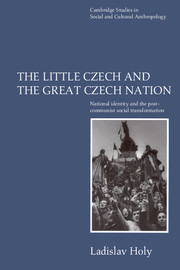 The Little Czech and the Great Czech Nation
The Little Czech and the Great Czech Nation Book contents
- Frontmatter
- Contents
- Acknowledgements
- Introduction
- 1 Nation against state
- 2 Freedom, nation, and personhood
- 3 Self-stereotypes and national traditions
- 4 National traditions and the imagining of the nation
- 5 National traditions and the political process
- 6 Nation and state in the context of Czech culture
- Notes
- References
- Index
5 - National traditions and the political process
Published online by Cambridge University Press: 05 June 2012
- Frontmatter
- Contents
- Acknowledgements
- Introduction
- 1 Nation against state
- 2 Freedom, nation, and personhood
- 3 Self-stereotypes and national traditions
- 4 National traditions and the imagining of the nation
- 5 National traditions and the political process
- 6 Nation and state in the context of Czech culture
- Notes
- References
- Index
Summary
A tradition is an asserted belief. This does not mean, however, that it is arbitrary. We can begin to appreciate this when we move beyond the description of its form and structure to consider how it is reproduced in social praxis and in whose particular interest it is formulated and invoked. Although a tradition is ostensibly invoked to make sense of the past, it is always invoked either from the standpoint of the present objective or from the standpoint of some future objective. It is the present or the future which determines certain presumed attitudes and characteristics to be ‘our traditions’. A tradition is thus, on the one hand, invoked to legitimate or to alter the present state of affairs and, on the other, to mobilise people to pursue some envisaged ideal state of affairs in the future. The present is thus made sense of, or the envisaged future is seen as desirable, in terms of the past. Conceptualised as evidence of the past, the tradition is at the same time seen as a historical force continuing in the present or ‘logically’ pointing the way to the society's historically predetermined future. One of its important functions is to link past, present, and future.
Neither a democratic tradition nor the tradition of a cultured and well educated nation was invoked under the communist regime in Czechoslovakia, when the traditions of revolutionary struggle, sympathy with the movements of national liberation from colonial oppression, and the long history of friendship with other peoples building socialism were part of the official political rhetoric.
- Type
- Chapter
- Information
- The Little Czech and the Great Czech NationNational Identity and the Post-Communist Social Transformation, pp. 138 - 167Publisher: Cambridge University PressPrint publication year: 1996
